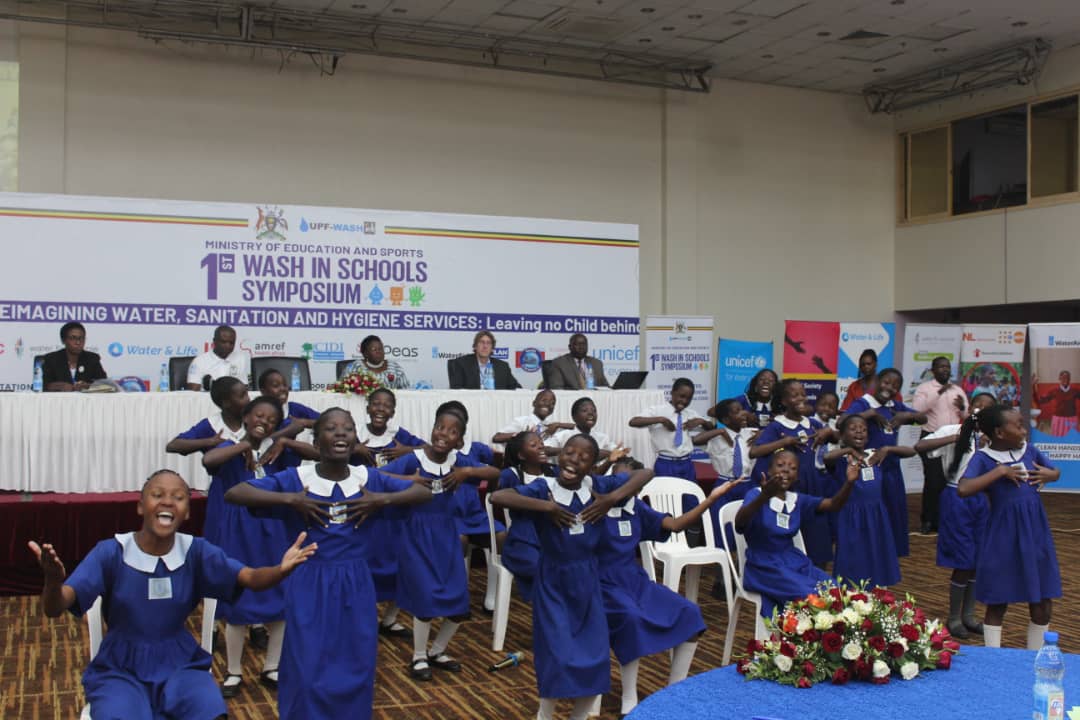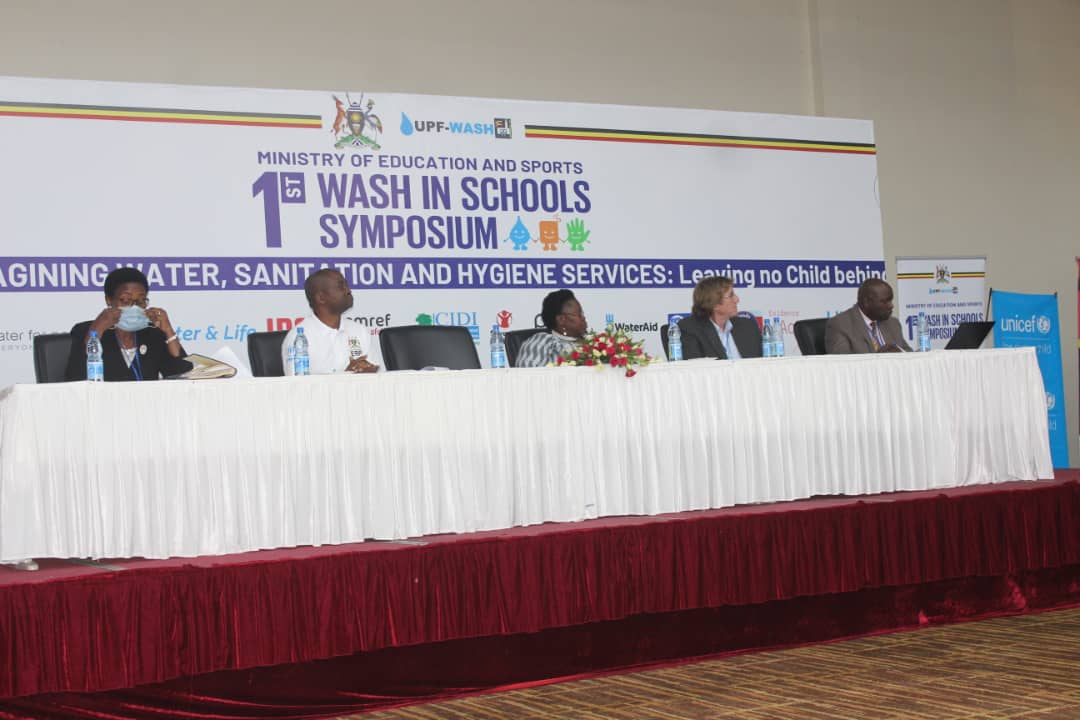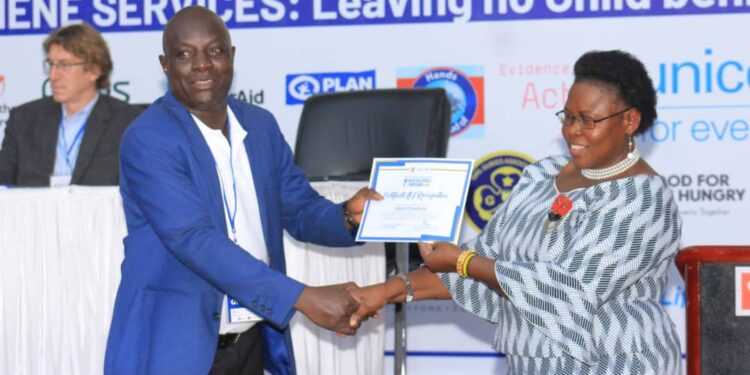The Minister of Education and Sports Hon. Janet Kataaha Museveni has revealed that heavy investment in the WASH sub-sector among communities and schools accelerates socioeconomic transformation in the country.
This assertion was made on her behalf by Hon. Joyce Moriku Kaducu, the State Minister for Primary Education, during a two-day first ever Water, Sanitation and Hygiene in Schools Symposium, hosted by the Education Ministry on June 26th, at Hotel Africana.
Hon. Kataaha contended that heavy investment in WASH perpetuates a healthy population, and hence a large chunk of funds that would be spent in dealing with sanitation shortcomings is allocated to other development projects, leading to wealth creation.

“There is a strong international consensus backed by scientific evidence, that provision of WASH in schools has major impact on health status, on the health outcomes, on educational achievements and reduction of disparities among students. Investments made in this sub-sector therefore results in tangible economic and social transformation,” Hon. Kataaha revealed.
She strongly hailed the collaboration between the Education Ministry and that of Water and Environment to put in place WASH infrastructure in schools, which she said is vital in ensuring a condusive learning environment for learners, leading to better grades.
“WASH infrastructure and services in schools are critical to ensure a safe and healthy learning environment where all children are able to reach their educational potential. A degree of impact that safe water, sanitation and hygiene has on a child’s health, retention and school performance is paramount,” stressed Hon. Kataaha.
Tailored around the theme “Re-imaging water sanitation and hygiene services to leave no child behind”, the Symposium was aimed at re-asserting the fact that WASH in schools is a very important aspect of the learning process for pupils and students, hinged on a consensus that without water, there is no life.
It provided a condusive arena for key players in the sanitation space to discuss challenges and solutions that work in improving Wash in schools, generate ideas to be escalated to all levels of government, so that the issue of Wash in schools can be resolved once and for all.
The seminar was largely embraced by legislators who subscribe to Uganda Parliamentary Forum on WASH (UPF), permanent secretaries, commissioners, key players from the private sector, civil society organizations, the academia, political leaders, high-end stakeholders from government ministries, departments and agencies, members of local governments, students from various various schools in Uganda, and other invited dignitaries.

The conference was also aimed at forging a common ground by key players in the sanitation space to perpetuate a holistic and multi-faceted approach in addressing gaps as far as actualizing proper hygiene and sanitation in schools is concerned, vital for ensuring sustainable livelihoods for learners and the entire citizenry.
Key architects of the symposium including the International Water and Sanitation Centre (IRC Wash Uganda), UNICEF, UNHCR, AMREF health Africa were alarmed by daunting statistics in the Wash domain, which threatens to increase the spread of communicable diseases and disorders like cholera, diarrhoea, dysentery, typhoid and others, which threaten livelihoods of school going children.
For instance; according to recent data from the Education Ministry, 43 local governments, which is equivalent to 27% do not have any partner working on Wash in Uganda, while 86 Local Governments, which represent 54% do not have a partner working on Wash in secondary schools.
Worse still, the same statistics indicate that only 22% of schools in the country meet the national pit latrine ration of 1:40 learners.
In this regard therefore, the symposium was an arena for key players in Uganda’s sanitation space, to deliberate on their efforts so far, in as far as the provision of wash services is concerned, effective practices, and how they can strengthen systems especially for coordination, monitoring and evaluation in regard to promoting proper hygiene and sanitation in schools.
While speaking to the congregation, Dr. Fred Muhumuza, a Principal Researcher on Development Policy at Makerere University echoed Hon. Kataaha’s assertions that proper cleanliness and hygiene among citizens helps to perpetuate wealth creation.
“Keeping one’s self and the sorroundings clean, and helping to prevent germs from entering the body, quiet a lot of diseases that are turning up in health facilities are originating out of poor wash practices and provisions, both in schools and at the community level. If we encourage wash everywhere, we would save the budget for health, productivity and elsewhere to grow our economy faster,” Dr. Muhumuza said.
He noted that effective enforcement of Wash services in schools helps to perpetuate good health for learners through proper disposal of waste material and killing of disease causing germs and bacteria, which is essential for the longevity of their stay in school and excellent academic performance.
“Children spend a significant time in, some up to age 23, while others up to age 25, and wash services affect their learning, their health and dignity most especially among girls. Good hygiene practices and clean school environment do contribute a lot to effective learning and therefore the provision of wash facilities should be the first step towards health learning and supportive school environment.”
Hon. Aogon Silas, the MP for Kumi Municipality, who is also the Chairperson for Uganda Parliamentary Forum on Water, Sanitation and Hygiene urged government to increase salaries for teachers due to their relentless efforts in actualizing proper hygiene and sanitation in schools through pushing learners to wash their hands with soap, and other detergents.
He implored Hon. Joyce Kaducu and other policy makers to work on mechanisms that would hastily see Parliament allocate a huge chunk of funds meant for the education sector to Wash services.
“Hon. Minister, Parliament normally commits resources to the Ministry of Education, we ask a question, will you close your eyes when it comes to increasing money for wash? Because sometimes we can say okay, 500 billion to the Ministry of Education, but how much of that component goes to wash? that’s the question. Those who are responsible for planning, when you are planning, do you remember to plan for Wash?” Hon Silas reiterated.
Also while addressing the congregation, country representative for UNICEF in Uganda Mr. Shadrack Omol reiterated the agency’s commitment to see to it that Wash services in schools are actualized at the highest level.
“UNICEF is committed to supporting the programs that target those schools and children that are in critical need of wash services, to ensure that we don’t leave any child behind in terms of how to support, by providing wash infrastructure, primary resilient water systems, separate sanitation facilities for girls and boys, menstrual hygiene management facilities through the close collaboration with ministry of education and Sports, Local Governments and CSO partners to implement a comprehensive wash in schools package.”
Ensuring proper sanitation and hygiene for the citizenry through Wash, is in tandem with Sustainable Development Goals (SDG’s) set by the United Nations, for instance; SDG 6, which aims at ensuring availability and Management of Water and Sanitation for all.
Do you have a story in your community or an opinion to share with us: Email us at editorial@watchdoguganda.com














